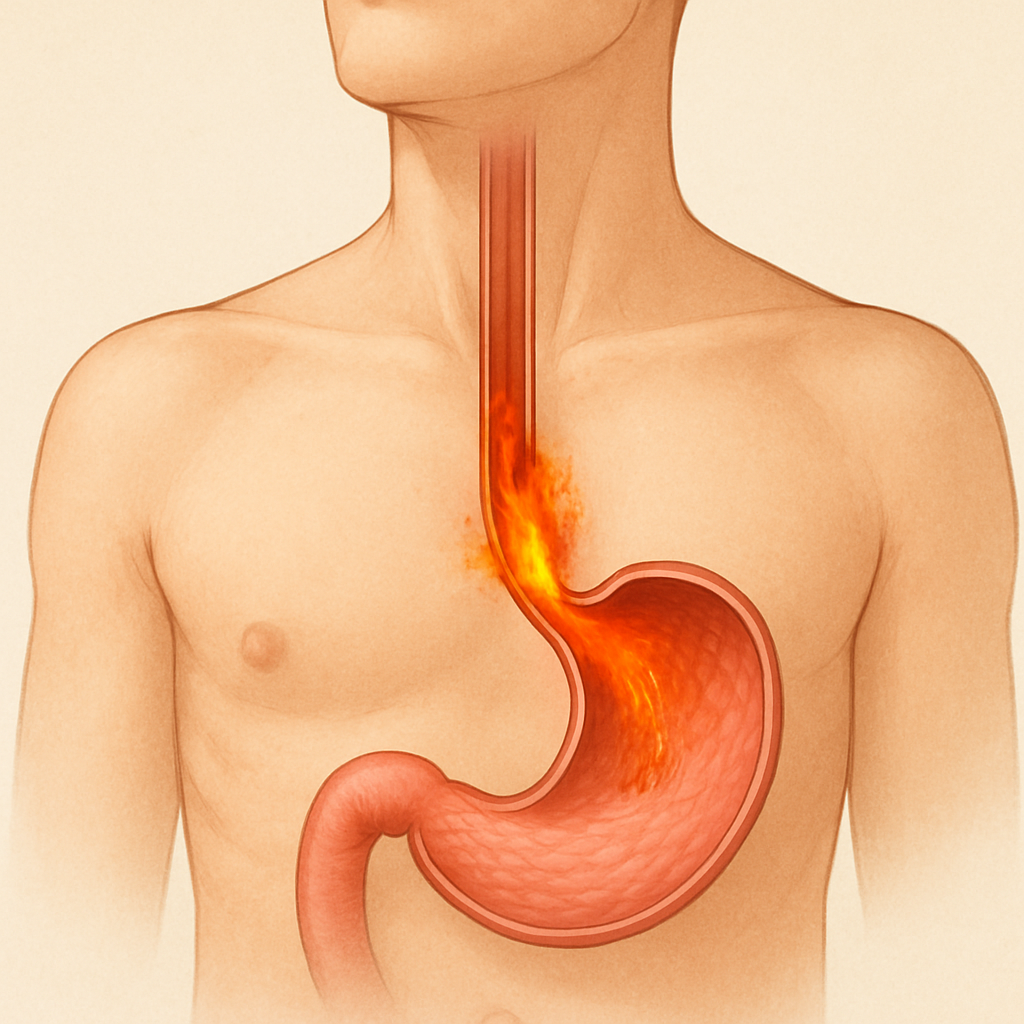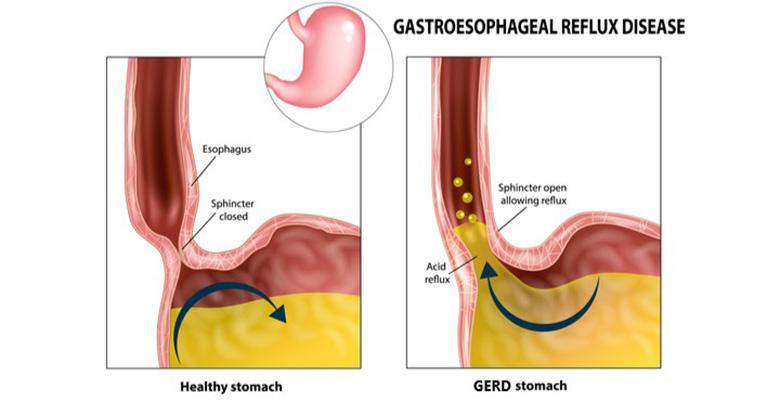Gastroesophageal reflux disease (GERD)

What is GERD?
Gastroesophageal reflux disease (GERD), also known as acid reflux or heartburn, is digestive diseases Chronic. It occurs when stomach acid flows back (refluxes) into the esophagus (food pipe). This acid reflux irritates and can sometimes damage the lining of the esophagus. Stomach acid can also come into contact with the vocal cords or even back up into the lungs.
During normal digestion, the muscular valve between the stomach and esophagus, called the lower esophageal sphincter, opens to allow food to enter the stomach and closes to prevent food and stomach acid from flowing back into the esophagus. GERD usually occurs when the lower esophageal sphincter is weak or defective. This condition allows stomach acid to flow back into the esophagus.
Occasional acid reflux is normal. However, if it happens more than twice a week for several weeks, it could be a sign of GERD.
What are the symptoms of GERD?
The most common symptom of GERD is heartburn, a burning sensation in the chest that spreads from the stomach to the throat. Other possible symptoms of GERD include:
- belching
- Bloating
- Hoarseness
- Feeling of something stuck in the throat
- Bitter taste in mouth (acid reflux)
- Chest pain or discomfort
- Pain and difficulty swallowing
- Prolonged sore throat
- Prolonged cough
What causes GERD?
No single cause has been identified. is causing gastroesophageal reflux disease. GERD usually occurs when the muscular valve between the stomach and esophagus is weak or defective. This condition allows stomach acid to back up into the esophagus.
What are the risk factors for GERD?
The following factors may trigger GERD or worsen acid reflux:
- Certain medical conditions , such as Zollinger-Ellison syndrome or scleroderma.
- Increased abdominal pressure due to obesity or pregnancy.
- Increased production of gastrin , a hormone that regulates stomach acid secretion.
- Hiatal hernia , a condition that occurs when the upper part of the stomach protrudes into the chest through an opening in the diaphragm. This causes a decrease in pressure in the esophageal sphincter.
- Certain medications , including asthma medications, calcium channel blockers, antihistamines, pain relievers, sedatives, and antidepressants.
- Certain foods and drinks , such as fried, spicy, or fatty foods, chocolate, mint, coffee, or alcoholic beverages.
- Smoking or secondhand smoke .
What are the complications and associated diseases of GERD?
Sometimes, GERD can lead to the following complications:
- Swollen vocal cords , also known as reflux laryngitis
- Esophageal stricture (obstruction) caused by scar tissue formed by repeated ulcers
- Barrett's esophagus , a change in esophageal tissue caused by long-term GERD, increases the risk of esophageal cancer
- Lung damage , which may include pulmonary fibrosis and bronchiectasis
- Esophageal ulcers , caused by heartburn from stomach acid
How to prevent GERD?
Certain lifestyle changes and over-the-counter medications can help control GERD. These measures may also help prevent or reduce the risk of the condition becoming chronic.
To control GERD, you should:
- Avoid overeating
- Avoid eating 2 – 3 hours before going to bed
- Avoid irritating foods and drinks , such as fried, spicy, or fatty foods, chocolate, mint, coffee, or alcoholic beverages
- Losing weight if you are overweight or obese
You may also consider taking the following over-the-counter medications:
- Antacids when suffering from mild GERD
-
H2 receptor blockers or certain proton pump inhibitors when suffering from chronic or moderate GERD
How is GERD diagnosed?
First, your doctor will review your symptoms and medical history. Based on this information, he or she may recommend lifestyle changes or medications to address the underlying problem.
If these interventions do not improve your symptoms, your doctor may recommend the following tests:
- Endoscopy to examine the lining of the upper gastrointestinal tract carefully. Biopsy may then be performed if necessary.
- Upper GI tract imaging to detect problems associated with GERD, such as hiatal hernia, esophageal stricture, and ulcers.
- Esophageal pH and impedance monitoring , measuring acid levels in the esophagus while you go about your daily activities.
- Esophageal manometry to check for sphincter weakness.
How is GERD treated?
There are different options for treating GERD, depending on the severity of your condition. Your doctor will evaluate your condition and recommend the most appropriate treatment.
Change your lifestyle and diet
Your doctor may recommend the following changes:
- Avoid eating late
- Avoid foods that trigger acid reflux.
- Wear loose clothing to avoid putting pressure on your stomach.
- Maintain a healthy weight
- Eat more small meals
- Sleep with your head elevated
- Quit smoking
Use prescription drugs
If you have moderate to severe GERD symptoms that are not relieved by lifestyle changes and over-the-counter medications, your doctor may prescribe certain medications. These prescription medications may include:
- Some types of proton pump inhibitors to reduce the amount of stomach acid secreted
- Prokinetic drugs , which help speed up the process of emptying the stomach
Surgery
Your doctor may recommend surgery if your GERD symptoms don't improve with lifestyle changes and medications. These tests may include:
- Surgery to suture the gastric fundus into the esophagus. This surgery is performed endoscopically and is the most common surgery to treat GERD. The goal is to increase pressure in the lower end of the esophagus and reduce reflux. This procedure often provides long-term control of reflux.
- Endoscopic techniques. Endoscopic suturing and radiofrequency energy may be used to tighten the sphincter. These newer procedures may be appropriate for some patients.
-------------------------------------------------------------------------------------------
👉 Contact SunCare for medical support and advice as well as professional private jet transportation services 🇸🇬 SUNCARE PTE. LTD SINGAPORE
🏠 Add: 10 Anson Road, #10-11 International Plaza, Singapore 079903
☎️ Hotline: +65 96727717 (Dr. Lien Minh - Director) Zalo, Viber
📨 Email: suncarehealth@gmail.com






